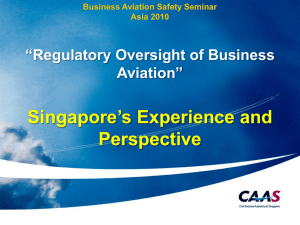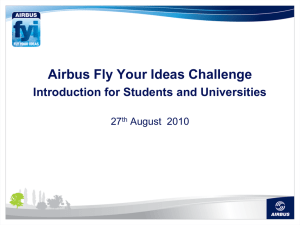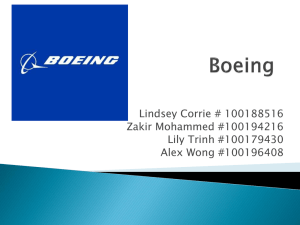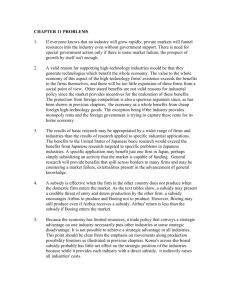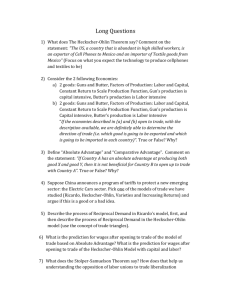Boeing vs Airbus: Trade Dispute Case Study
advertisement
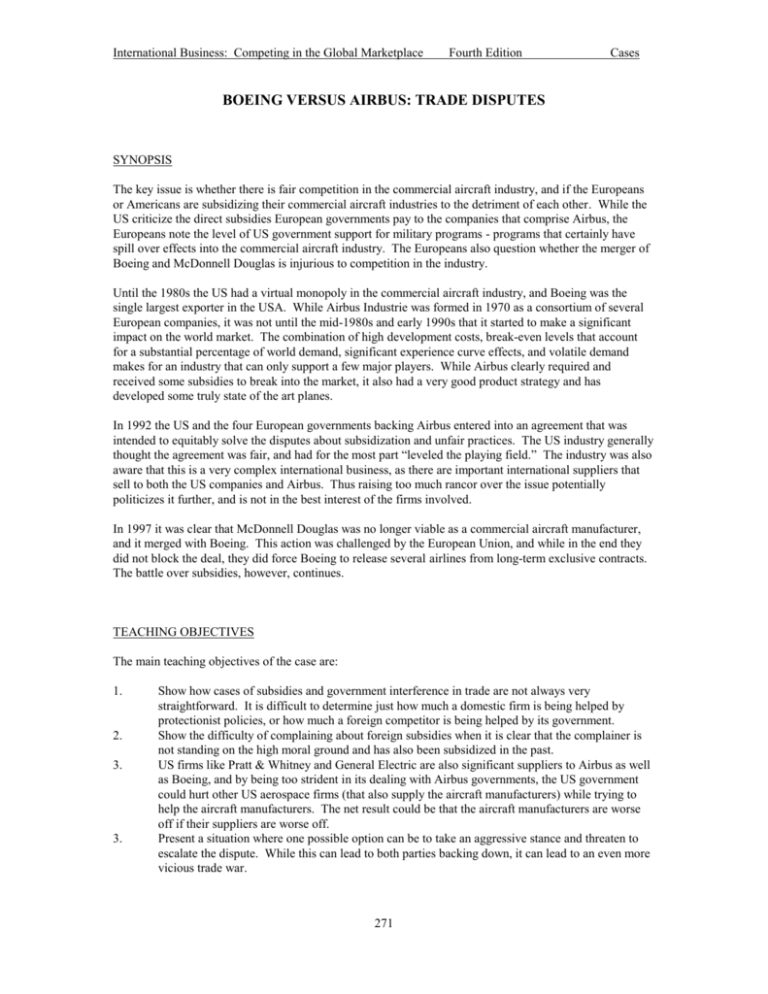
International Business: Competing in the Global Marketplace Fourth Edition Cases BOEING VERSUS AIRBUS: TRADE DISPUTES SYNOPSIS The key issue is whether there is fair competition in the commercial aircraft industry, and if the Europeans or Americans are subsidizing their commercial aircraft industries to the detriment of each other. While the US criticize the direct subsidies European governments pay to the companies that comprise Airbus, the Europeans note the level of US government support for military programs - programs that certainly have spill over effects into the commercial aircraft industry. The Europeans also question whether the merger of Boeing and McDonnell Douglas is injurious to competition in the industry. Until the 1980s the US had a virtual monopoly in the commercial aircraft industry, and Boeing was the single largest exporter in the USA. While Airbus Industrie was formed in 1970 as a consortium of several European companies, it was not until the mid-1980s and early 1990s that it started to make a significant impact on the world market. The combination of high development costs, break-even levels that account for a substantial percentage of world demand, significant experience curve effects, and volatile demand makes for an industry that can only support a few major players. While Airbus clearly required and received some subsidies to break into the market, it also had a very good product strategy and has developed some truly state of the art planes. In 1992 the US and the four European governments backing Airbus entered into an agreement that was intended to equitably solve the disputes about subsidization and unfair practices. The US industry generally thought the agreement was fair, and had for the most part “leveled the playing field.” The industry was also aware that this is a very complex international business, as there are important international suppliers that sell to both the US companies and Airbus. Thus raising too much rancor over the issue potentially politicizes it further, and is not in the best interest of the firms involved. In 1997 it was clear that McDonnell Douglas was no longer viable as a commercial aircraft manufacturer, and it merged with Boeing. This action was challenged by the European Union, and while in the end they did not block the deal, they did force Boeing to release several airlines from long-term exclusive contracts. The battle over subsidies, however, continues. TEACHING OBJECTIVES The main teaching objectives of the case are: 1. 2. 3. 3. Show how cases of subsidies and government interference in trade are not always very straightforward. It is difficult to determine just how much a domestic firm is being helped by protectionist policies, or how much a foreign competitor is being helped by its government. Show the difficulty of complaining about foreign subsidies when it is clear that the complainer is not standing on the high moral ground and has also been subsidized in the past. US firms like Pratt & Whitney and General Electric are also significant suppliers to Airbus as well as Boeing, and by being too strident in its dealing with Airbus governments, the US government could hurt other US aerospace firms (that also supply the aircraft manufacturers) while trying to help the aircraft manufacturers. The net result could be that the aircraft manufacturers are worse off if their suppliers are worse off. Present a situation where one possible option can be to take an aggressive stance and threaten to escalate the dispute. While this can lead to both parties backing down, it can lead to an even more vicious trade war. 271 International Business: Competing in the Global Marketplace Fourth Edition Cases This case fits well after chapter 5, as it includes elements of the political economy of international trade. Since this is really an ongoing issue, the case may be able to be augmented by recent articles from periodicals. STRATEGIC ISSUES AND DISCUSSION QUESTIONS 1. Do you think that Airbus could have become a viable competitor without subsidies? Given the large investments, long break-even times, significant experience curve effects, and volatile demand, it is inconceivable that a firm like Airbus could have successfully entered the industry without subsidies. While Airbus clearly developed new technology and had a very good product strategy, either the governments or the parent firms would have had to provide subsidies for quite some time for Airbus to be able to develop its new aircraft and get sales volume up to a break-even level. . 2. Why do you think the four European governments agreed to subsidize the establishment of Airbus. The aircraft industry provides a large number of direct jobs, and even greater number of indirect jobs. The aircraft industry also creates a number of spillover effects into other industries that can use the technology developed for aircraft. The European governments are also owners (or part owners) of domestic airlines, would rather give the aircraft business to domestic firms. For instance, until 1979, the English government owned all of British Airways. It was not until 1987, that BA was privatized. Lufthansa was not privatized until 1997, and has more than 400,000 shareholders, mostly in Germany. Iberia airlines was nationalized (not privatized) in 1949, and remains in partnership with British Airlines for passenger memberships. As of this writing Air France has remained one of Europe's last state-owned airlines. However the French Government recently announced that it would float around 17% of the company's shares on the stock market. The deal is expected to earn the government around 610m euros ($707m). Given such direct ties of European airlines to European governments it is easy to understand why the EU would be protective of any threat to them. Also, European governments are perhaps even concerned about the balance of payments effects of having to purchase all aircraft from US manufacturers. 3. Is Airbus' position with regard to the dispute over subsidies reasonable? Airbus' position is reasonable. It does not deny any of the subsidies it receives, but says that the US government provides significant subsidies to the US firms indirectly via NASA and defense spending. Beyond this, the government in the first half of this century largely funded the development of the US aircraft industry. Hence since the US industry was given a head start through government funding (and continues to receive indirect subsidies from government contracts), the subsidies Airbus has received more simply allow it to catch up. Its contention that another reason for its success is a smart product strategy and state of the art technology is also valid. 4. Given the 1992 agreement, what additional action (if any) should the US government take with respect to Airbus? At this time it does not appear that there would be much reason to take action other than monitor compliance with the 1992 agreement and take action only to address deviance from the agreement. 5. Why do you think that the US industry reacted with caution to attempts by US politicians to reopen the trade dispute in 1993? 272 International Business: Competing in the Global Marketplace Fourth Edition Cases There are several reason why the industry reacted with caution. One, the upturn in business and market share diminished the immediate importance of the issue. Secondly, there may simply an interest in seeing how well the 1992 agreement works before suggesting changes. Thirdly, politicians can as easily screw things up as help, and may actually make more of a mess than help. Fourth, the international interconnectedness of this industry is substantial, and while the aircraft manufacturers may compete, they also collaborate with suppliers and don’t want to disrupt other well functioning international relations. Finally, they realize that Airbus isn’t going to go away, and in many ways it is better to have a healthy competitor that acts rationally than a struggling competitor that may take desperate measures that hurt the entire industry. 6. In an era of global competition, what is the case for antitrust authorities to permit the formation of large domestic firms through mergers and acquisitions? In an era of global competition, foreign competitors that can use their large foreign markets to achieve economies of scale may threaten domestic firms that do not have sufficient size to reap economies of scale and attack fragmented markets in other countries. Thus antitrust authorities need to not only consider local competitive dynamics and market share, but what is required for local firms to compete in the global marketplace. (Now this argument is a bit overstated for the case of Boeing, but it clearly is relevant for the formation of Airbus.) 7. Was the threat by EU authorities to declare the Boeing McDonnell Douglas merger illegal a violation of US national sovereignty? There are two sides to this argument. On one hand, the US government should have final and complete say over whether mergers of domestic firms are appropriate or not. For the EU to intervene would be a violation of US sovereignty. On the other hand, these firms both do business in Europe, and a merger would affect European firms. Thus the EU has a legitimate point in wanting to regulate the activities of firms that do significant business in the EU. The argument is less valid for action taken by the EU during the summer of 2001 when it actually struck down a merger between two U.S. companies, Honeywell and General Electric. That merger already had full approval of U.S. governmental agencies. In a shocking decision, the EU ruled that the merged company would not benefit the European consumer and prohibited it from occurring. 8. Do you think the EU Commission had a strong case in its attempt to wring concessions from Boeing regarding the merger with McDonnell Douglas? Was Boeing right to make significant concessions to the EU? What might have occurred if the concessions were not made? Since this is a question of opinion, there can easily be some room for justifying multiple points of view. Overall the EU had a tough case to make, and its major intention was probably to wring some concessions from Boeing. The concessions were not that significant, however, as airlines have strong incentives to not switch suppliers in any case (maintenance and spare parts costs are greatly reduced with a sole supplier). If these concessions were not made, the EU would have had to find some other face saving approach in order to justify its reluctant acceptance of the merger. When the concessions were made, the EU emerged stronger, received a vote of confidence from the European consumer, and was positioned to act without apparent impunity in the GE/Honeywell deal. 9. Airbus has now become a corporate entity that is 80% owned by EADS. How do you think this new corporate structure might change the longstanding dispute between Boeing and Airbus over subsidies? It will undoubtedly strengthen the position of Airbus because it will have direct, immediate influence on the economies of the supporting countries. Now that the European manufacturers own Airbus outright, it is a single corporate entity (rather than a consortium). That means its political clout is concentrated and that its 273 International Business: Competing in the Global Marketplace Fourth Edition Cases influence of governmental subsidy issue can be considerable. because of this change the dispute is only likely to escalate. 274


